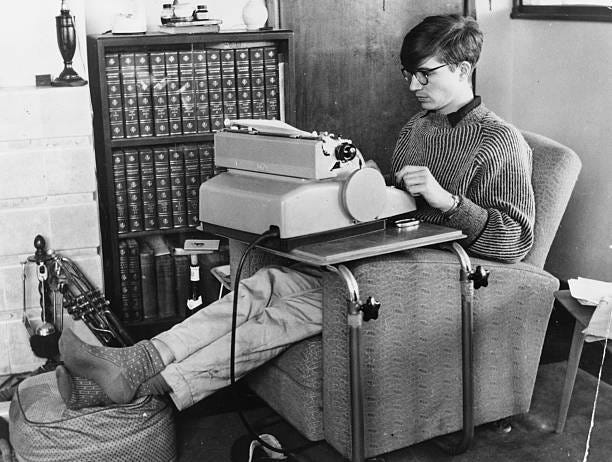I encountered this book when I was 18. It was the first of the three books that I consider transformative in my early years. They all launched a passion for philosophical and spiritual discovery that has defined my adult intellectual life.
The Outsider entered my psyche as an awakening to knowledge that had seemed hidden. It introduced me to Colin Wilson who became a literary touchstone for decades to come and presented what my 18-year-old mind craved, acknowledgment and celebration of feeling different.
It was not the kind of feeling on display in today’s superficial identity politics. When I read the book in 1974 I found no group with which I could easily identify, no movement I could conjure up an alignment to, no community of the like-minded. It was a deep sense of not belonging anywhere. So reading about historical Outsiders was like discovering a long-lost family.
The Outsider was published in 1956. It opens with the sentence "The outsider is a social problem. He is the hole-in-the-corner man." and goes on to offer several literary examples of being someone outside looking in. Themes of alienation, confusion, the existentialist angst, etc. are all treated with the same perspective of feeling not quite at home in the larger culture.
Colin Wilson's debut on the literary scene marked one of the opening notes of the cultural revolution of the sixties. Wilson celebrated the misfit not as a figure be "fixed" and reintegrated into society, but as a lone traveller through life who often had a stirring artistic, political, or spiritual innovation to convey to society.
Wilson lived this book as much as writing it. As an impoverished 23-year-old, the Englishman slept in a tent in a London park so that he could be free of material demands to dedicate himself fully to his study. When The Outsider appeared in 1956, it became a sensation among both critics and beatniks, who formed the vanguard of the dawning sixties upheavals.
In Wilson's epic exploration of mystics, visionaries, literary pioneers, political troublemakers, and rule breakers of all sorts, he evoked a new kind of heroism, which changed how we view ourselves and our purpose in life.
It was my introduction to the likes of Nietszche, Camus, D.H. Lawrence, Hesse, Dostoevsky, Yeats, Hemingway, Blake, and more. Each of these would be a profound intellectual adventure. So having them unified under the outsider theme gave them a context at which my young mind and heart lept.
Asked to summarize the alienation problems faced by an Outsider, Wilson said (and yes, the outsiders he discussed were male):
“The Outsider wants to cease being an Outsider. He wants to be integrated as a human being, achieving a fusion between mind and heart. He seeks vivid sense perception. He wants to understand the soul and its workings. He wants to get beyond the trivial. He wants to express himself so he can better understand himself. He sees a way out via intensity, extremes of experience.”
The image on the cover of the book that sat on my shelf is, to my mind, a perfect illustration of the angst combined with rejection that an Outsider feels. Without a doubt this was the sense of detachment I experienced. Seeing other people as coverings without substance, acting out their social roles, was a common experience. Eventually I realized I was somtimes doing the same and that many people also felt such alienation. Ah, the folly of youth.
Looking back over the decades I can still sense the effect of this book on my subsequent reading choices that served my intellectual and spiritual explorations. Upon revisiting it recently, I was struck by the depth and the value it could have for today’s young seekers of truth. I can only imagine the value of diving into the literary Outsiders of the past rather than the empty fame-seeking of the latest Tik Tok personality. Alas…
Interestingly, while the themes of the book are essentially that of being alone, I found the experience of reading the book provided a sense of camaraderie with others who consider themselves outsiders. It was both comforting and ironic.







Nice book review